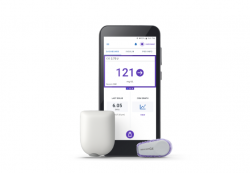Insulet's Omnipod insulin management system has been partially subsidised in Australia for the past year, with the company assisting patients to manage out-of-pocket costs.

Omnipod, subsidised via the federal government's National Diabetes Services Scheme (NDSS) since December last year, provides non-stop insulin delivery through a tubeless, waterproof pump without requiring multiple daily injections. It provides up to three days of continuous insulin delivery via a wearable pod.
Patient Heath is a convert to the technology. "It has helped me keep my blood glucose levels stable. More than that, it has helped me deal with the mental drain of the stigma, such as when you are at a restaurant, and people look at you injecting insulin as if you're a drug addict. Now, they think I'm sending a text message."
"It has made such a difference to my quality of life. In the past, there was always a certain number of finger pricks each day. These made your fingers hurt and numb at the same time. You could feel the pain each time you did one. You squeeze a lemon, and it hurts, but it also almost causes callouses to form on the fingers, so you lose sensitivity as well.
"Many people probably don't understand the dramatic difference it makes. With the Omnipod, you can do multiple updates of little bits of insulin to do a little light tweak and keep you on that flat and narrow path of a good glucose number. Nobody I know likes injections, and I estimate that since I started on Omnipod, I've saved myself 5,400 injections," said Heath.
Professor David O’Neal, a senior endocrinologist with the Department of Endocrinology at St. Vincent’s Hospital, said that the evolution of insulin delivery has enabled a more ambitious approach to diabetes management.
He said the ability to control blood glucose levels much closer to target levels over longer periods and from a younger age will deliver incremental but life-changing patient benefits.
"These devices have transformed lives. I've been doing this since 1990, and certainly since 2003, when we established our first pump clinic, these devices have improved. It's like comparing a calculator with a high-end laptop. The devices today have made a huge difference to the well-being of patients."
Professor O'Neal said, "As clinicians, it's our job to provide patients with information on the pros and cons of different therapies and devices. Ultimately, patients are living with a treatment or device daily and must choose what is best for them. Having that choice is important. I might think a device is wonderful and provides fantastic metabolic control, but if the patient doesn't think it suits their life, maybe because it's bulky and uncomfortable, they may not want to use it."
He said decision-makers need to consider the needs of patients, such as parents with children or carers of someone who is cognitively impaired.
While Insulet's Omnipod is subsidised via the NDSS, patients must pay almost $170 monthly. This falls to $30 for patients with 'gold' level private health insurance.
Insulet says many patients without the appropriate level of health insurance find that the out-of-pocket monthly cost puts the Omnipod beyond reach. In response, the company offers a pay-as-you-pod style subsidy, which does not require the patient to hold health insurance. It provides people living with diabetes with the option to purchase one, two or three boxes of pods at a time.
In addition, the company said patients can access Omnipod for $90 for the first 90 days instead of the monthly unsubsidised price of $420.
